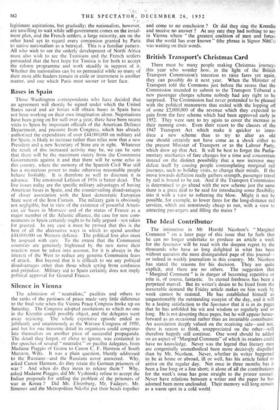British Transport's Christmas Card
There must be many people making Christmas journeys this year who wonder how, in the light of the British Transport Commission's intention to raise fares yet again, they can possibly do it next year. When the Minister of Transport told the Commons just before the recess that the Commission intended to submit to the Transport Tribunal a new passenger charges scheme nobody had any right to be surprised. The Commission had never pretended to be pleased with the political manoeuvre that ended with the lopping off of some £2,000,000 of the revenue which they expected to gain from the fare scheme which had been approved early in 1952. They were sure to try again to cover the increase in their running costs. Even their resort to the clauses of the 1947 Transport Act which make it quicker to intro- duce a new scheme than to try to alter an old one should certainly not have come as a shock either to the present Minister of Transport or to the Labour Party, which drew up that Act. It will be best to forget the Parlia- mentary mechanics of fare changes for a time and concentrate instead on the distinct possibility that a new increase may defeat itself by causing people contemplating marginal rail journeys, such as holiday visits, to change their minds. If the move towards deflation really gathers strength, passenger travel by rail is bound to be cut.' And if the Transport Commission is determined to go ahead with the new scheme just the same there is a great deal to be said for introducing some flexibility into it with a view to softening the blow. Might it not be possible, for example, to lower fares for the long-distance rail services, which are notoriously cheap to run, with a view to attracting pasEengers and filling the trains ?


























 Previous page
Previous page